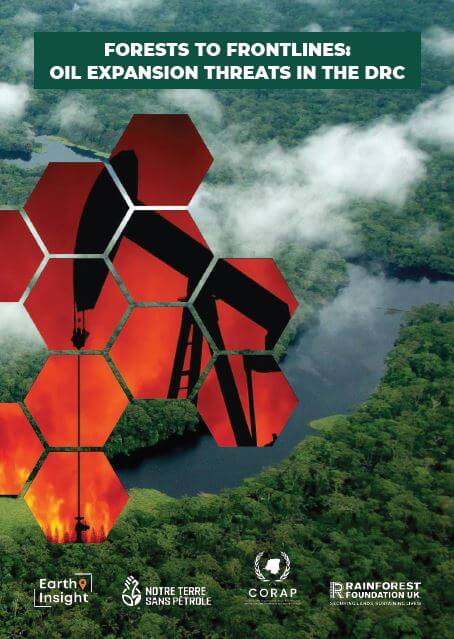New analysis shows extent of threat posed by new DRC oil block licensing round
29 July 2025
Kinshasa, DRC / London, UK
A new report, released today by Earth Insight in collaboration with Rainforest Foundation UK (RFUK) and Congolese partners Our Land Without Oil (Notre Terre Sans Pétrole) and CORAP, reveals the potential social and environmental impacts of planned oil development in the Democratic Republic of Congo (DRC).
The government cancelled a controversial auction of 27 oil blocks at the end of 2024 amid intense opposition from civil society and community groups, only to launch a major new licensing round in May, approving tenders for 55 oil blocks, 52 of them announced for the first time. These concessions now cover more than half the country, including vast swathes of intact forests, protected areas and critical community lands.
Now a spatial mapping and analysis lays bare the extent of the threat posed by this unprecedented expansion of extractive activity. Among the most concerning findings:
- 8.3 million hectares (23%) of protected areas, 8.6 million hectares of Key Biodiversity Areas and a staggering 66.8 million hectares (64%) of intact tropical forests fall within the proposed oil blocks.
- 72% of the newly established Kivu–Kinshasa Green Corridor, a flagship conservation initiative touted by the DRC government earlier this year, is now overlapped by oil blocks, severely undermining its ecological and climate value.
- The Cuvette Centrale, the world’s largest tropical peatland complex and a key global carbon sink storing an estimated 30 gigatons of carbon, is at serious risk of degradation. Most of this vital ecosystem now lies within newly designated oil areas.
- Approximately 39 million people, including many Indigenous Peoples and forest communities, live in or near these new oil blocks, threatening livelihoods, cultures and basic survival. This also includes 63% of all community forests in the country.
Despite the scale of these threats, resistance is growing. In June, civil society groups across the DRC and internationally, including many with whom we work closely, mobilised during a Week of Action to call out government institutions and multinational companies involved in the oil deals. The Our Land Without Oil campaign, launched by a coalition of Congolese organisations, continues to build momentum, demanding the cancellation of these oil concessions.
“Imagine: 39 million Congolese people, almost half the population, - and 64% of our forests could be directly affected by the awarding of these oil blocks,” said Pascal Mirindi, Campaign Coordinator, Notre Terre Sans Pétrole. “And all this while the government is promoting the ‘Kivu-Kinshasa ecological corridor’. Where is the logic? Where is the coherence? We are reminding our leaders that the Congolese people are the primary sovereign. We will not remain silent while certain people organise themselves to sell off our future.”
RFUK joins our partners in urging the DRC government and its international partners to move away from harmful fossil fuelled development and towards a low-carbon future rooted in its vast renewable energy potential and rights of its forest communities.

Share this:

